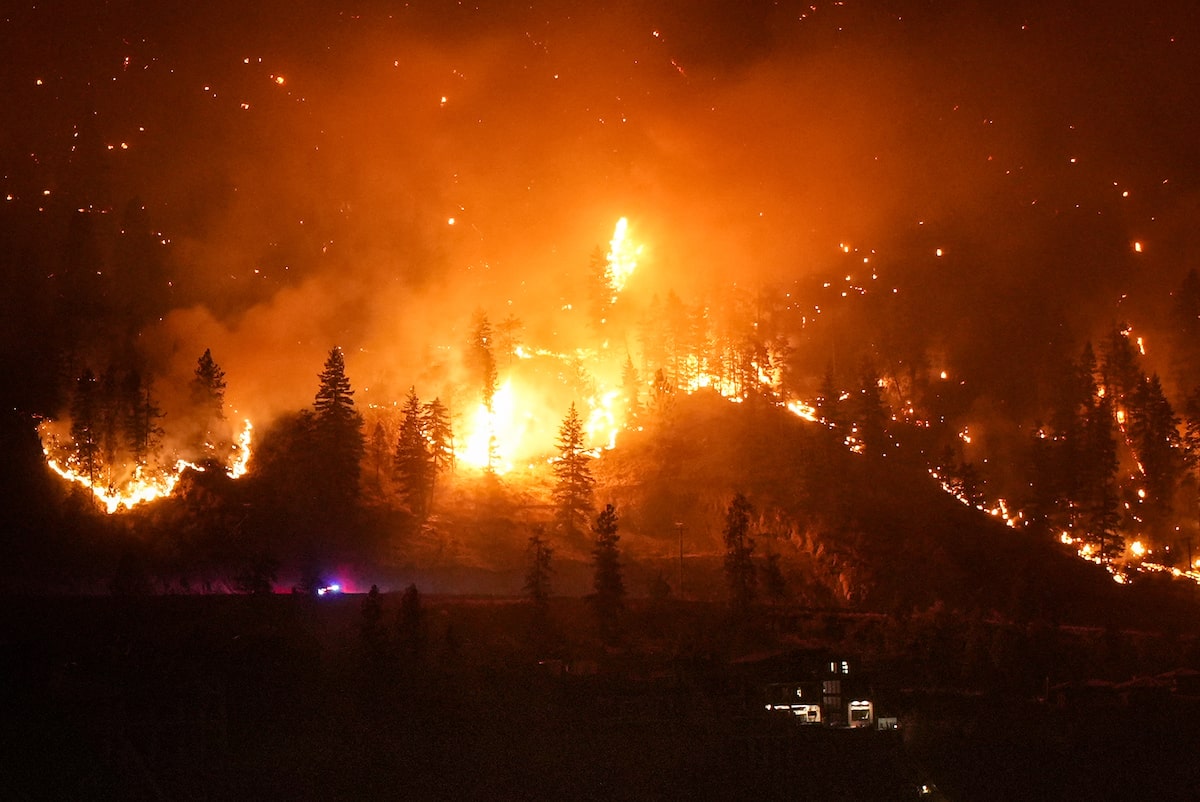The McDougall Creek wildfire burns on a mountainside above a lakeside home in West Kelowna, British Columbia, on August 18, 2023.Darryl Dyck/The Canadian Press
Elliott Cappell is PwC Canada’s national climate change leader and supports the Canadian Sustainability Standards Council as a climate change subject matter expert. He previously served as Toronto’s Chief Resilience Officer.
My dad is from Nova Scotia and he likes to say that if you don’t like the weather in Halifax, just wait 15 minutes. The same idea applies to climate change in Canada today. Things change rapidly and the past may not be a good predictor of the future.
As Canada’s warmest winter on record comes to an end, it seems obvious what we’re facing. The World Meteorological Organization confirmed in its latest State of the Global Climate that 2023 will be the hottest year on record so far, and the National Oceanic and Atmospheric Administration found there is a one-in-three chance that 2024 will be even hotter. So wildfires and droughts, and the pain and challenges they bring, seem likely this summer.
But paradoxically, these conditions can also increase the risk of flooding, as dry and hot conditions harden the ground, allowing it to absorb less water. These conditions can also lead to unwelcome short-term changes in nature and biodiversity, such as an increase in ticks in Ontario, which thrive after mild winters.
In short: we have to expect the unexpected.
However, one trend does seem like a safe bet: we, especially businesses, are increasingly supporting climate adaptation. Business action on climate adaptation continues to lack a sense of urgency, both in Canada and globally. But in discussions with business leaders, I’ve observed a recent shift toward corporate climate action being driven by an unexpected source: customers who want to adapt. For example, farmers are driving demand for drought-resistant crops, new insurance products, and artificial intelligence weather forecasting. Other less encouraging but still relevant examples come from companies that saw sales of air purifiers increase five-fold in the northeastern U.S. during last summer’s wildfires in Canada, or are preparing to meet long-term growth in demand for cooling equipment such as air conditioners and fans.
In the past few years, talking about making money from adapting to climate change has seemed taboo. Climate activists often describe this as exploiting disaster or diverting attention away from the more important challenge of reducing emissions. But now, businesses in Canada and around the world appear ready to seize adaptation opportunities, particularly in industries most affected by the real risks of climate change, such as insurance, infrastructure, engineering, natural resources and, of course, agriculture.
This spring and summer, then, will serve as a bellwether for how Canadian businesses think about climate adaptation, especially as the Canadian Sustainability Standards Council solicits input on recommended approaches for its organizations to disclose sustainability-related information. The consultation, which ends in June, will ask Canadian companies how they plan to assess their own climate resilience. The consultation has practical implications; the Canadian Securities Administrators, which manages federal and provincial capital markets regulation, said subsequent reports may provide us with proposed Provide information on revisions to climate-related disclosure rules.
The optimistic view is that once Canadian businesses are regulated to assess and disclose their climate risks and opportunities, they will face pressure to act. Rules and regulations will help, but these need to be coupled with management and boards improving their ability to truly understand physical risks.
It is entirely reasonable that global warming will continue to exceed the 1.5°C target of the Paris Agreement, and may even far exceed it. In 50 years, the world’s temperatures could rise by 2, 3 or even 4 degrees; to put this into perspective, the world has warmed by at least 4 degrees since the last ice age 5000 years. As a result, changes in customers, markets and supply chains can be significant and rapid. To ensure corporate disclosures are meaningful, helping them understand physical risks is a priority.
On the other hand, governments face a complicated spring and summer on climate documents. The late Lord John Godfrey explained climate action as a whole-of-government issue that requires coordination across multiple ministries or departments, as well as across government. government issues that require cooperation among municipalities, provinces and territories, and the federal government. But the recent political debate over carbon pricing is just the latest example of the complexities facing whole-of-government collaboration on climate change in Canada today.
However, just like the weather in Halifax, we can see some rapid changes here. The carbon pricing debate has been playing out over the winter, when Canadians pay more for natural gas. Once we enter wildfire or water shortage season, the tenor of the discussion may change. These potential discursive changes are most likely to occur at the municipal or regional level, as people living in cities come to realize that they are on the front lines of climate change and its physical consequences and better understand the costs associated with climate change. . For example, the City of Toronto just passed a mandate calling for a renewed focus and coordinated approach to building resilience to climate change while developing plans to reduce emissions.
To me, saying we should expect the unexpected seems like a less than bold prediction. But the coming months are likely to see the combined effects of accelerating climate warming, increased corporate climate action, and changing consumer and public sentiment. While wildfires, droughts, and floods are certainly reasonable to expect, now is the time we do our best to prepare for the uncharted waters we find ourselves in.
#Opinion #Canadas #Mild #Winter #Expect #Surprises #Climate #Change
Image Source : www.theglobeandmail.com
